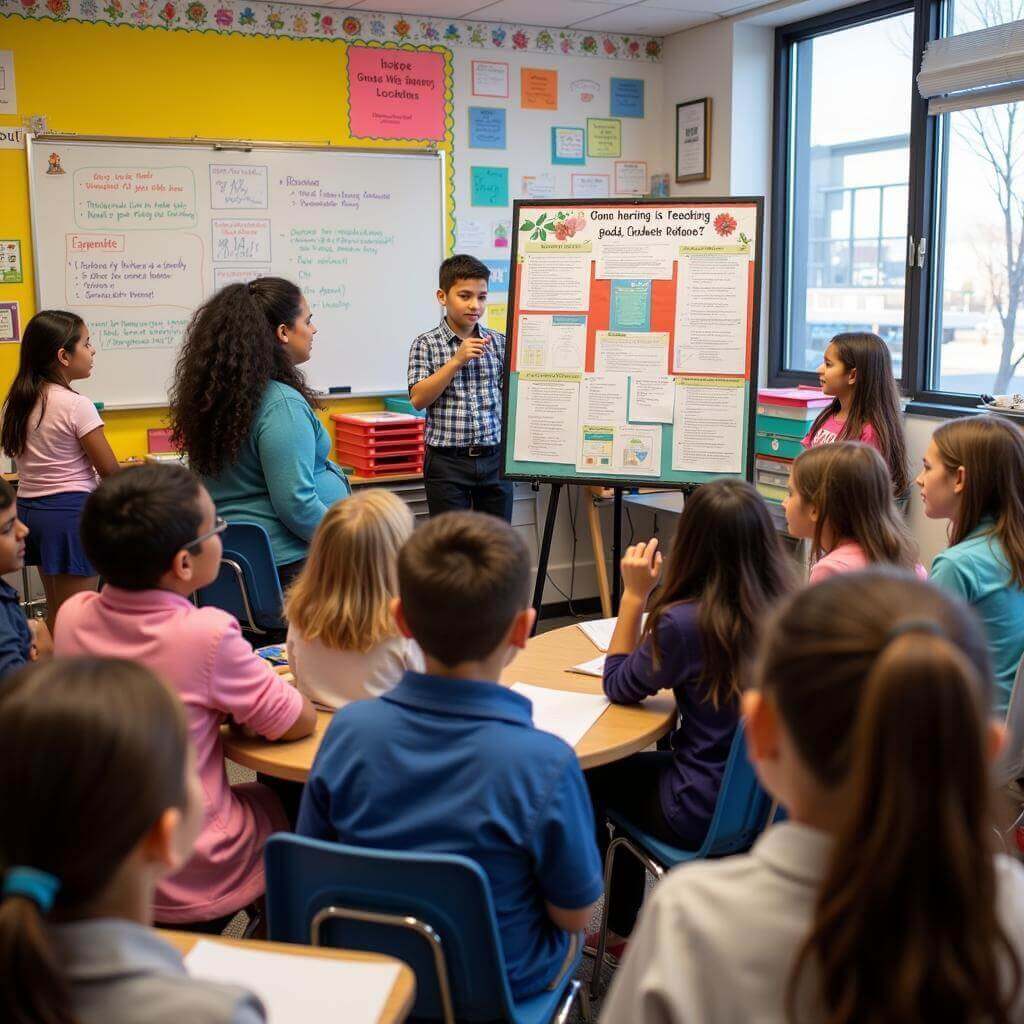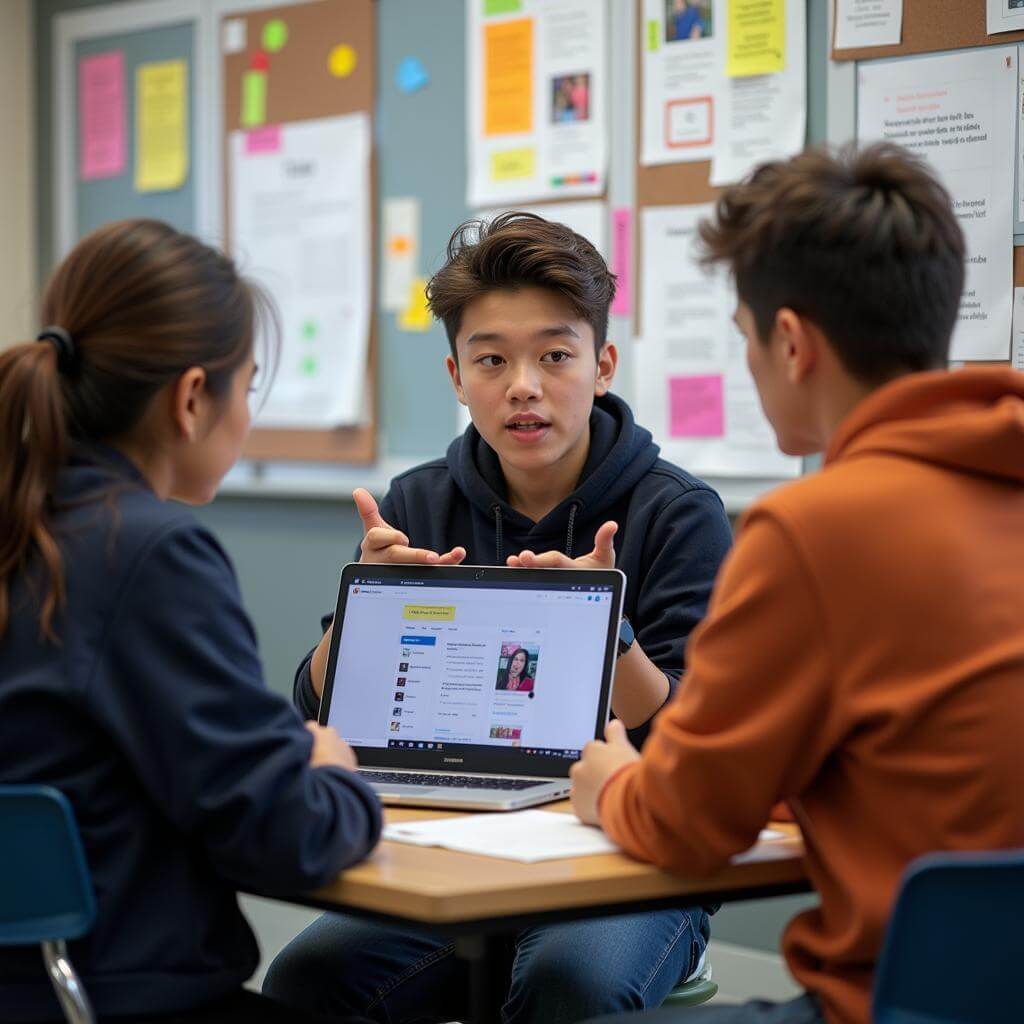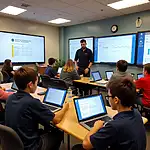The IELTS Reading test often covers diverse topics in education and societal trends. Today, we’ll explore a practice test focusing on the rise of student-led conferences in shaping school culture. This topic Cultural differences in family involvement in education is increasingly relevant in modern educational settings. Let’s dive into the passages and questions to hone your reading skills.
Passage 1 – Easy Text
The Evolution of Parent-Teacher Conferences
Parent-teacher conferences have long been a staple of the educational system, providing a platform for educators and parents to discuss student progress. However, a new trend is emerging that puts students at the center of these crucial conversations. Student-led conferences are gaining popularity across schools worldwide, transforming the traditional parent-teacher meeting into a more collaborative and empowering experience.
In a student-led conference, the pupil takes charge of presenting their academic progress, achievements, and areas for improvement to their parents and teachers. This approach shifts the focus from a passive reporting of grades to an active demonstration of learning. Students prepare portfolios of their work, reflect on their academic trajectory, and set goals for future growth. This process not only enhances their communication skills but also fosters a sense of responsibility for their education.
Educators have observed that this model encourages students to become more self-aware and invested in their learning journey. By articulating their progress and challenges, students develop a deeper understanding of their strengths and weaknesses. Moreover, this format allows parents to see their child’s capabilities firsthand, often leading to more supportive and informed parental involvement in education.
The implementation of student-led conferences has shown promising results in improving student engagement and academic performance. Schools report increased attendance at these events, as students feel a greater sense of ownership and pride in showcasing their work. This shift in conference dynamics also aligns with modern pedagogical approaches that emphasize student agency and personalized learning.
 Student presenting work in a classroom setting
Student presenting work in a classroom setting
Passage 2 – Medium Text
The Impact of Student-Led Conferences on School Culture
The introduction of student-led conferences has had a profound impact on school culture, extending far beyond the confines of individual classrooms. This innovative approach to academic reporting has sparked a paradigm shift in how educational institutions view student involvement and responsibility. As more schools adopt this model, a ripple effect is observed throughout the entire educational ecosystem.
One of the most significant changes noted is the enhancement of student agency. By placing students at the helm of their academic discussions, schools are effectively communicating that student voices matter. This empowerment translates into increased motivation and engagement in day-to-day learning activities. Students who participate in these conferences often exhibit improved metacognitive skills, demonstrating a greater awareness of their learning processes and a more proactive approach to addressing academic challenges.
The shift towards student-led conferences has also necessitated changes in curriculum design and teaching methodologies. Educators are increasingly focusing on project-based learning and formative assessments that provide students with tangible evidence of their progress. This approach aligns with the conference format, where students are expected to showcase and reflect on their work. Consequently, there’s a growing emphasis on developing critical thinking and self-reflection skills throughout the academic year.
Moreover, the implementation of student-led conferences has fostered a more collaborative school environment. Teachers report improved relationships with both students and parents, as the conferences create a shared understanding of educational goals and challenges. This collaborative spirit often extends to peer relationships, with students becoming more supportive of each other’s learning journeys.
The impact on parental involvement is equally noteworthy. Parents who attend student-led conferences often gain a more comprehensive understanding of their child’s educational experience. This increased awareness frequently leads to more meaningful at-home discussions about learning and a greater appreciation for the educational process. Schools have observed that this enhanced parental engagement contributes to a more supportive and cohesive school community.
However, the transition to student-led conferences is not without its challenges. Some educators express concerns about the time required to prepare students for these presentations, while others worry about maintaining academic rigor. Additionally, there’s a learning curve for all participants – students, teachers, and parents – in adapting to this new format. Despite these hurdles, many schools find that the benefits of student-led conferences in fostering a more dynamic and student-centered learning environment outweigh the initial difficulties.
 Student, teacher, and parent engaged in discussion
Student, teacher, and parent engaged in discussion
Passage 3 – Hard Text
The Pedagogical Foundations and Future Prospects of Student-Led Conferences
The emergence of student-led conferences as a transformative educational practice is deeply rooted in contemporary pedagogical theories and responds to the evolving demands of 21st-century education. This approach aligns with constructivist learning theories, which posit that knowledge is actively constructed by the learner rather than passively received. By orchestrating their academic narratives, students engage in a metacognitive process that reinforces their understanding and retention of learned material.
The theoretical underpinnings of student-led conferences draw heavily from the work of educational psychologists such as Lev Vygotsky and his concept of the Zone of Proximal Development (ZPD). In this context, the conference serves as a scaffolding mechanism, allowing students to articulate and extend their learning with the guidance of more knowledgeable others – in this case, teachers and parents. This process not only consolidates existing knowledge but also propels students towards new levels of understanding and capability.
Furthermore, student-led conferences embody the principles of formative assessment, a key component of effective learning as outlined by researchers like Dylan Wiliam and Paul Black. By regularly reflecting on and presenting their work, students engage in ongoing self-assessment, which has been shown to significantly enhance learning outcomes. This continuous feedback loop allows for real-time adjustments in learning strategies and promotes a growth mindset among students.
The implementation of student-led conferences also intersects with broader educational trends, such as the push for personalized learning and the development of 21st-century skills. As students take charge of their academic narratives, they inherently practice skills such as communication, critical thinking, and self-direction – competencies that are increasingly valued in higher education and the workforce. This alignment with future-oriented educational goals makes student-led conferences a particularly appealing model for schools aiming to prepare students for the challenges of a rapidly changing world.
However, the widespread adoption of student-led conferences faces several systemic challenges. Educational institutions must grapple with logistical constraints, including time allocation and resource management. There’s also the need for comprehensive professional development to equip educators with the skills to facilitate this new conference format effectively. Additionally, schools must address equity concerns, ensuring that all students, regardless of their background or academic standing, can fully participate in and benefit from this model.
Looking to the future, the evolution of student-led conferences is likely to be influenced by technological advancements and changing societal expectations. The integration of digital portfolios and virtual conferencing tools may expand the reach and depth of these academic discussions. There’s also potential for incorporating elements of project-based learning and interdisciplinary studies, allowing students to present a more holistic view of their educational journey.
As educational systems continue to adapt to global changes, the role of student-led conferences in shaping school culture is expected to grow. This approach not only enhances academic outcomes but also cultivates essential life skills and fosters a sense of ownership over one’s education. The ongoing refinement and expansion of this model may well represent a significant step towards a more student-centered, empowering, and effective educational paradigm.
 Student presenting digital portfolio in conference
Student presenting digital portfolio in conference
Questions
Passage 1
-
What is the main focus of student-led conferences?
A) Improving teacher performance
B) Enhancing parent-teacher communication
C) Empowering students to present their own progress
D) Reducing the workload of teachers -
According to the passage, what do students prepare for these conferences?
A) Written reports
B) Portfolios of their work
C) Standardized test scores
D) Teacher evaluations -
Which of the following is NOT mentioned as a benefit of student-led conferences?
A) Improved communication skills
B) Increased sense of responsibility
C) Better grades
D) Enhanced self-awareness -
The passage suggests that student-led conferences align with which educational approach?
A) Traditional lecturing
B) Standardized testing
C) Personalized learning
D) Rote memorization -
True/False/Not Given: Parents are more likely to attend student-led conferences compared to traditional parent-teacher meetings.
Passage 2
-
What is described as a “paradigm shift” in the passage?
A) The change in school funding
B) The way schools view student involvement
C) The introduction of new technology in classrooms
D) The restructuring of school administrations -
Which of the following is mentioned as a result of implementing student-led conferences?
A) Increased student dropout rates
B) Higher teacher salaries
C) Improved metacognitive skills in students
D) Reduced parental involvement
8-11. Match the following effects with the appropriate group they impact:
Effects:
8. Improved relationships
9. More comprehensive understanding of educational experience
10. Enhanced critical thinking skills
11. Greater focus on project-based learning
Groups:
A) Students
B) Teachers
C) Parents
D) Curriculum
-
What challenge is mentioned regarding the implementation of student-led conferences?
A) Lack of student interest
B) Insufficient funding
C) Time required for preparation
D) Opposition from school boards -
True/False/Not Given: All educators unanimously support the transition to student-led conferences.
Passage 3
-
Which learning theory is aligned with the concept of student-led conferences?
A) Behaviorism
B) Constructivism
C) Cognitivism
D) Functionalism -
How does the passage relate student-led conferences to Vygotsky’s concept of the Zone of Proximal Development?
A) As a replacement for the ZPD
B) As a contradictory theory
C) As a scaffolding mechanism within the ZPD
D) As an unrelated educational concept
16-19. Complete the sentences below using NO MORE THAN TWO WORDS from the passage:
Student-led conferences incorporate principles of 16 assessment, which is crucial for effective learning. This approach promotes a 17 among students. The conferences also help develop 18 skills, which are valued in higher education and the workforce. However, schools must address 19 concerns to ensure all students can benefit from this model.
- What does the passage suggest about the future of student-led conferences?
A) They will be phased out
B) They will remain unchanged
C) They will likely evolve with technological advancements
D) They will be replaced by standardized testing
Answer Key
- C
- B
- C
- C
- True
- B
- C
- B
- C
- A
- D
- C
- False
- B
- C
- formative
- growth mindset
- 21st-century
- equity
- C
This IELTS Reading practice test explores the concept of student-led conferences and their impact on education. By engaging with these passages and questions, you’ve practiced various question types and honed your skills in extracting key information from academic texts. Remember to apply these strategies in your IELTS preparation and actual exam. Good luck with your studies!


